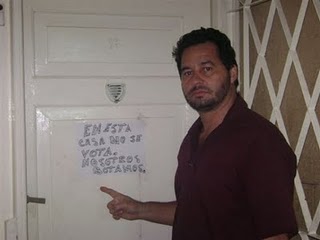
Literature and Justice
The award-winning writer Angel Santiesteban is imprisoned unjustly for his confrontational attitude to the Castro regime.
On Wednesday, February 27, at the headquarters of the Estado de Sats project there was a farewell to Angel Santiesteban Prats, the award-winning writer. The next morning, he will present himself to serve the prison sentence imposed on him.
That same day, on asking my opinion as a lawyer, I began to know the details of his case. When I started to read the documentation, the conviction that I was in the presence of a crude judicial hoax took hold of me.
The center of Santiesteban’s misfortunes is his ex-wife Kenia Rodriguez Guzman. She wants to emigrate, but as a loving mother she wants to do so together with Eduardo, the son of her union with Angel. For this she needed his authorization; but he does not want to leave Cuba nor be separated from his offspring, so he refused permission and expressed his willingness to assume custody of and care for the boy when she left.
It was then that the former wife, who on top of everything suffers from psychiatric disorders, offered to make accusations that involved him in criminal proceedings. On a first occasion, the complaint for an offense of threats failed, as the prominent writer was acquitted.
In July 2009, Kenya accused her former husband of trespassing into her home and beating her in the face. With the passage of time, she “enriched” her statement, saying he had stolen her family jewels and, almost a month later, that he had raped her and tried to murder her by suffocating her with a pillow. There was also talk about an alleged attempt to burn down Kenia’s house.
In short, the authorities discarded the additional complaints of the woman as unfounded. Naturally, the question arises: If we reach the conclusion that she lied about the alleged theft, murder and rape, then why not admit the probable falsity of the other complaints that she made!
This would follow not only from the contradictory testimony of the complainant, but also other elements of the case. Eduardo‘s teacher testified to a conversation with him: At first, the child accused his father to her, but then began to cry and on the teacher asking why he was crying, the boy told her that his mother told him to lie against Angel.
Alexis Quintana deserves special mention. This individual, in his alleged status as the only eyewitness, was the star of the havoc that Santiesteban, according to what Quintana said, tried to wreak in Kenia’s home. However, in a video presented to the Court, Quintana acknowledged that he had seen nothing, and that his statement was lies, made at the insistence of the woman, and that he received gifts in payment for it.
These two statements are very important, not for their relationship with the facts of the case (with which they have no direct link), but for what they bring to the lack of credibility of the complainant. If she does not hesitate to influence others — including her own son!– to formulate false statements against the object of her hatred, why wouldn’t she herself lie!
Three witnesses testified to having been with the defendant in another place at the time of the alleged incidents. The Court, in rejecting these witnesses, invokes the statement of the minor child Eduardo. However, he said later he spent the afternoon only in his father’s house, so that his statement did not in any way contradict the other three witnesses, who were ignored in a Olympian manner.
Given the absence of incriminating evidence, the courtroom, to back up the version of the complainant, called a handwriting expert. Like the charlatans that follow Lombroso to “demonstrate the responsibility” of an accused person, studying the shape of his ears or the prominence of his chin, so the supposed expert dared to swear before the Court that Santiesteban was guilty… based on his handwriting!
After forcing Angel to copy by hand an entire page of the garbage published by the official newspaper Granma, a lieutenant colonel in the Interior Ministry rose to assert nothing more and nothing less than… The size, form and slant of his handwriting constituted irrefutable proof the he was guilty of the charges.
In short, the Court, based on the statements of an enemy of the accused (who is also a mental patient), and the “handwriting expert,” declared Santiesteban guilt of the crimes of housebreaking and serious injury.
Article 287.1 of the Penal Code, which establishes penalties of three months to one year, or a simple fine, was used to describe the first of two violations; however for this crime the court set the illegal sentence of two years in prison, double the maximum allowed! For the serious injuries, which call for a sentence of between two and five years, the court imposed the upper limit. Suspicious supreme severity for an intellectual lacking a criminal record!
With respect to those bodily injuries, their seriousness was established based on the supposed perforation of an eardrum, causing hearing loss. But in the medical certificate not a single word is said about it. Thus, even if one considers some aggression on Angel’s part, there was reasonable doubt that this event cause the injury suffered by Kenya, who was even hit by a vehicle.
Another curious fact: Although this was supposedly a common — not a political — case, the appeal was heard by the Court for Crimes against State Security. The delay of years undergone in the conduct of this case and the whole set of circumstances already mentioned, lead us to assume that Angel Santiesteban is being pursued for the rebellious stance he took against the regime.
National and international public opinion must interest itself in this case.
Rene Gomez Manzano
Attorney and Freelance Journalist
Havana, March 4, 2013
21 May 2013
